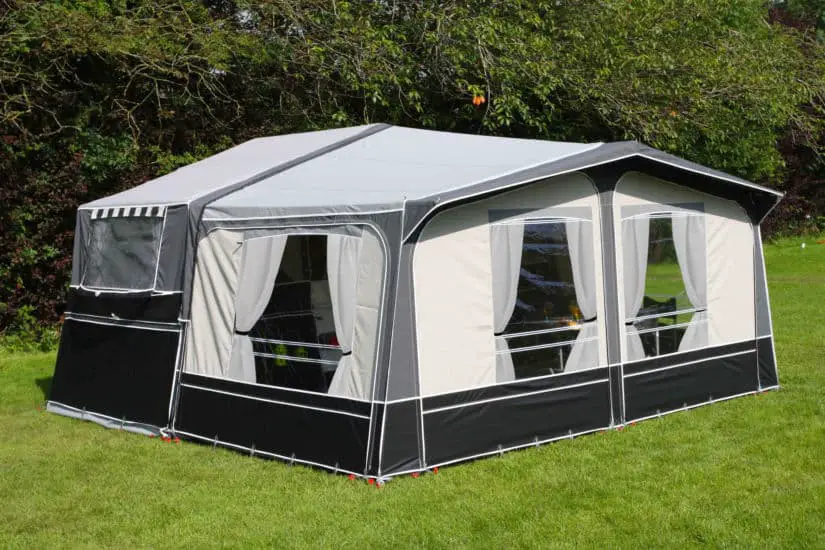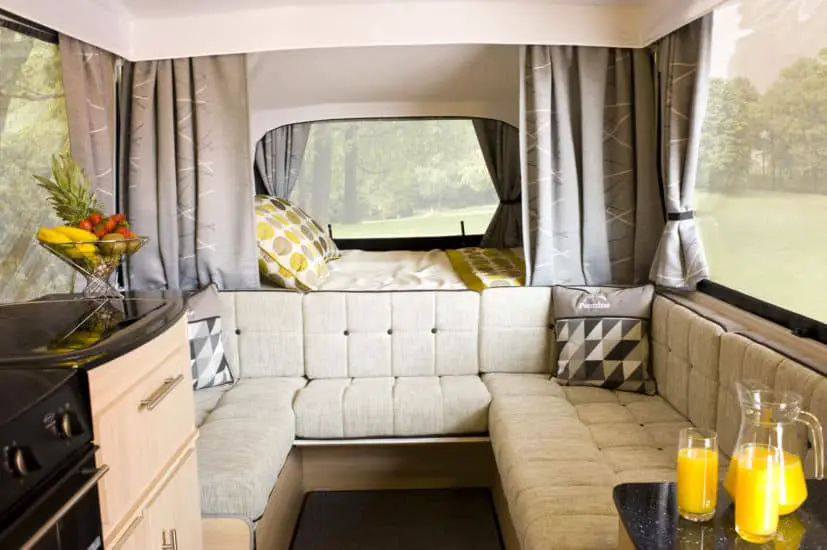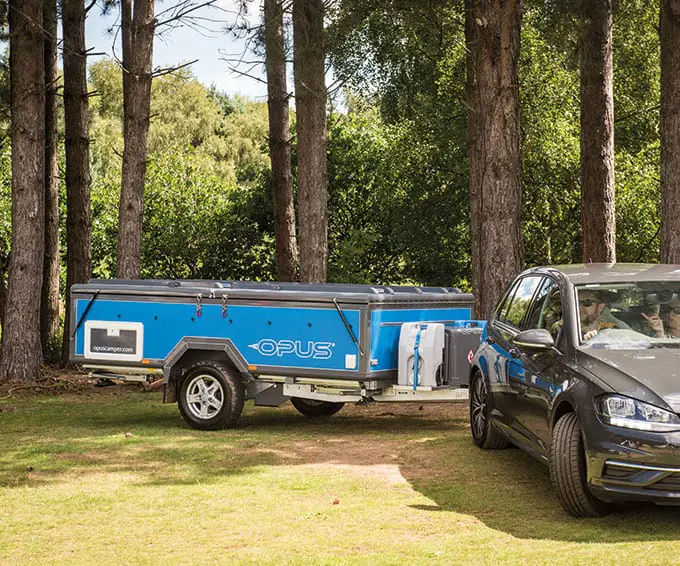Before purchasing my first folding camper, I was concerned that I wouldn’t be able to tow it with my car. Finding out the information I needed about towing a folding camper took forever when I was doing my research, so I created this blog post to ensure that it doesn’t take you as long.
Can I tow a folding camper? Most vehicles will be able to tow a folding camper. Folding camper weights range from 600kg to 1000kg, and the fully laden weight of your folding camper should be no more than 85% of the kerbweight of the car that you are towing it with. Your car handbook will tell you the maximum towing capacity of your vehicle.
Knowing the weight of the folding camper you want and the maximum towing capacity of your car is essential before you purchase a camper. The last thing you want is to be unable to tow a folding camper after buying one! Below we have some information on the towing capacity of popular cars and the average weight of a folding camper so you can make an informed decision.
Legally Towing A Folding Camper
Typically, folding campers are relatively light. You should be able to tow one without worrying about whether you are towing legally or not. However, some countries have specific rules for towing that it’s important to be aware of.
In the UK, drivers that have passed their Category B driving test since 19 January 2013 can legally tow a trailer weighing no more than 750kg, or a trailer weighing over 750kg as long as the vehicle and trailer combined weigh no more than 3,500kg. The average weight of a folding camper is approximately 600kg. This means you can legally tow most popular campers, even if you passed your test since January 2013.
Across the majority of Europe, the same or similar rules as the UK apply. For example, you are allowed to tow a trailer in France with a maximum authorised mass of 750kg. This MAM includes both the trailer and its load. Whether you’re travelling in Europe or anywhere else in the world, it’s crucial to always check the towing limits before you travel.
I’ve travelled extensively across Europe with my family and our folding camper, and I’ve noticed that although the towing laws are typically similar, they do differ slightly. As an example, when towing in Germany, the fully laden weight of a trailer without brakes must not exceed one half of the unladen weight of the towing vehicle plus 75kg, but in total not more than 750kg.
The Average Weight Of A Folding Camper
After some research, I found that the weight of folding campers can differ greatly. However, most folding campers fall into the 600 – 1000kg range. Here are some popular folding campers and their weights.
Pennine Fiesta 2020

The Pennine Fiesta 2020 ex works weight is 620kg, the carry capacity is 130kg, and the gross weight is 750kg.
You can tow this folding camper across the majority of Europe without any special licence as the gross weight is 750kg.
Pennine Pathfinder 2020

The ex works weight of a Pennine Pathfinder 2020 is 840kg, the carry capacity is 160kg, and the gross weight is 1000kg.
In most European countries, you will be able to tow this camper provided it and the vehicle your towing it with weigh less than 3,500kg combined.
Conway Countryman 2020

The Conway Countryman 2020’s ex works weight is 620kg, its carry capacity is 130kg, and its maximum gross weight is 750kg.
As with the Pennine Fiesta, you can tow this camper around the majority of Europe without worrying about the weight.
Air Opus

The overall weight of the Air Opus is 800kg, although there are a range of options to choose from which vary in weight.
Depending on the specification of Air Opus that you choose, you should be able to comfortably tow it without much hassle.
5 Tips For Towing Your Folding Camper
Even though folding campers are relatively light in comparison to most caravans and vehicles, towing one can be difficult for drivers with little towing experience. I know personally that towing is challenging no matter the weight of the trailer from when I first got my folding camper. Here are my main tips for towing a camper safely.
#1. Give yourself more time and pay more attention. Once you start towing your camper, your vehicle will handle differently. You must change the way that you drive to travel safely when towing your folding camper.
Before setting off, you should first check that the tyres on your camper and your vehicle are correctly inflated. When you begin driving, you will need to be more cautious when coming to junctions, setting off at roundabouts and slowing down to go round corners.
When towing your camper, you should always begin slowing down sooner than you normally would when coming up to a junction or a road you’re turning into. You should also leave a greater distance between you and other vehicles so that you can safely slow down in any situation.
#2. Ensure you use a type approved tow bar. When towing around Europe, it is important to ensure that you are using a ‘type approved’ tow bar. A tow bar is type approved if it meets EU regulations.
Having an EU type approved tow bar installed on your vehicle is the safest way to tow. Your type approved tow bar needs to be fitted by a professional. It is the responsibility of this professional to ensure that your vehicle is fitted with the correct tow bar. They will also make sure that it is fitted correctly.
#3. Be aware of differences in speed limit. In most European countries, you have to abide by lower speed limits when towing a folding camper or any other trailer. For example, in the UK you should never exceed 80kmh/50mph on single carriageways or 95kmh/60mph on dual carriageways when you are towing your camper.
While you should always abide by lowered speed limits when driving, you should always be extra aware in certain weather conditions. For example, if you’re travelling when it is windy, you should drive slower than you would when just driving your car. When braking, you should take care to brake slowly and steady your steering wheel to avoid any difficulties controlling your camper.
In most countries, when towing a trailer you shouldn’t use the outside lane of a three-lane motorway. It’s important to be aware of rules such as this so you don’t end up in a dangerous position on the roads.
#4. Be more aware of the roads. When travelling with your folding camper, it’s important to be more attentive when driving.
You should try and pay more attention to road surfaces, as things such as potholes can destabilise your folding camper if you’re not careful. By increasing your awareness of the roads, you’ll give yourself time to avoid obstructions and prevent yourself from having to heavily use the brakes.
If your trailer begins to sway, simply slow down gradually. If you slam on the brakes at any point, you could further destabilise your camper. Once you’ve slowed your vehicle, your camper should stabilise. If your camper doesn’t stabilise after you’ve slowed down, stop, reload your camper and this should resolve the problem.
#5. Try to avoid reversing as much as possible. Reversing when towing a folding camper is very difficult. I’ve ended up having to reverse a few times when towing my camper and found it very challenging, so the best thing to do is to avoid reversing as much as possible.
Maneuvers in general are difficult when towing a folding camper, but reversing in particular is the hardest maneuver in my experience. When parking whilst towing my camper, such as at a campsite or a place we’ve stopped on the way to our destination, I have parked in a way that allowed me to pull forward to drive away.
If you need to reverse when driving your folding camper, it is possible. In fact, if you are confident or experienced at towing, reversing can be fairly easy. However, if you have limited towing experience, reversing is a challenge best avoided until you get some practice in.


